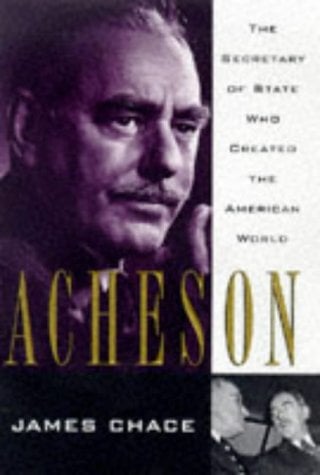James Chace’s biography of Dean J Acheson is a generally interesting book dealing with a provocative figure. What makes it less than engrossing is the predictability of Chace’s left-liberal judgments. Because of his pervasive bias, he never surprises: Republicans in the 1920’s were heartless plutocrats and dimwitted isolationists, against the working man and for tariffs. Never mind the facts: e.g., that tariffs usually enjoyed bipartisan support in Congress; that Hoover and other Progressive Republicans championed collective bargaining and public works programs; and that Republican administrations, far from being isolationist, were feverishly negotiating disarmament treaties and lavishing “loans” upon foreign governments. Chace, who invariably regards relations with communist governments as problematic, unqualifiedly defends Wilson’s and Franklin Roosevelt’s wars for democracy, while his unflattering comments about “Japanese warlords” and the Third Reich are never matched in verbal intensity by his assessment of communist tyranny.
Finally, his portraits of conservative Republican leaders—in particular, Robert Taft—are both patronizing and contradictory. Though Chace accurately describes Taft as “humorless in debate but well informed, hardheaded, and determined to curb America’s involvement in a world beyond its control,” he does not concede any truth to that outspoken conservative, casting him as an “isolationist” even as the senator insists that his differences with the Democratic administration are over the appropriate military aid to be given during the Cold War. Taft’s opposition in 1951 to the Pleven Plan, for an integrated Euro-American defense force that led to the formation of NATO, was not based on a “Fortress America” mentality; it exemplified Taft’s concern that the United States might maintain a large land force in Europe indefinitely, thus enhancing consolidated executive power and hardening war-time socialism into a permanent condition. Taft also believed, correctly, that Western Europe had the capability of creating its own defense force, provided the United States furnished air and naval support. He did not oppose an integrated Western European force but saw no compelling reason to have Washington run it. And, contrary to Chace’s misstatement, Taft did vote for the Marshall Plan, in its final draft.
Taft was wrong, and Acheson right, however, about the extent of American intervention on the side of Nationalist China. Taft’s willingness to throw discretion—and his own principles—to the wind in defense of Chiang Kai-shek’s government against a popular communist insurgency demonstrated the power of the China lobby over post-war congressional Republicans. On this point, Chace is right to scold Taft and his Republican senatorial colleagues, though Taft did not advocate the commitment of American land forces in the China conflict, as Chace suggests. Indeed, it might be argued that, as a Western country culturally and geographically, the United States had far more to lose from seeing Europe engulfed by communism than it did by the fall of China to indigenous communists.
The son of the Episcopal bishop of Connecticut and a descendant of both British Unionist Canadian and Ulster Loyalist families, Acheson mixed easily with English aristocrats. In his demeanor, appearance, and speech, he epitomized patrician elegance and gained affection and respect from Konrad Adenauer, Anthony Eden, and other anti-communist European statesmen. In his set-tos with the even more illustriously connected Taft (the son of a president and grandson of Grant’s secretary of war and attorney general), Acheson was more eloquent and had far greater presence than his opponent. Though less distinguished as an undergraduate at Yale, the glib Acheson made Taft look insufferably pedantic when he debated with him before the Senate Policy Committee.
Nonetheless, the American right had good reason to distrust Acheson, however much in retrospect one may approve of his general record as Truman’s secretary of state. His political career, from the time he clerked for Justice Louis Brandeis through his enthusiastic association with the New Deal, indicated what seemed at times a reckless support for organized labor. Acheson was also conspicuously pro-British, even for a WASP patrician. As a charter member of the Century Croup and the Committee to Defend America—both interventionist associations formed in 1940—and as a close friend of leading politicians in Canada and England, Acheson was thought to be connected to British intelligence. (This may in fact have been the case, as the historian Thomas Mahl suggests in Desperate Deception, a history of British intelligence operations in the United States.) Even more significantly, Acheson had long-standing personal and professional contacts with two figures then and now widely believed (though not by Chace) to be communist spies, Harry Dexter White and Alger Hiss. Shortly before his appointment as secretary of state in January 1949, Acheson helped Hiss draft a statement to be read before the House Un-American Activities Committee; later he did more than friendship required not to repudiate Hiss, claiming that the case had been concocted by anti-Truman Republicans despite the super-abundant evidence linking the Baltimore socialite to communist espionage. Because of Acheson’s obstinacy, even Truman’s most dependable Republican ally in the Senate, Arthur Vandenberg, expressed his distaste for voting to confirm the new secretary of state.
Such circumstances, pace Chace, must be taken into account in attempting to understand why decent and usually principled Americans, like Robert Taft, harbored reservations about Acheson. Unlike Chace, they did not consider him a “pragmatist” or a “reahst” but someone who carried compromising baggage. Like Chace, I admire Acheson’s diplomatic skills, but I believe that the baggage was real. Though Acheson was clearly more engaging than the dough-faced Taft, the senator from Ohio was by far the greater defender of constitutional government, and may have been the better patriot as well.
[Acheson: The Secretary of State Who Created the American World, by James Chace (New York: Simon and Schuster) 512 pp., $33.00]



Leave a Reply